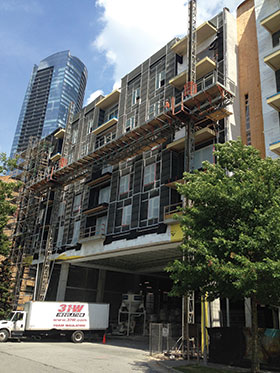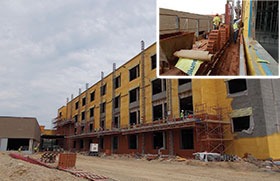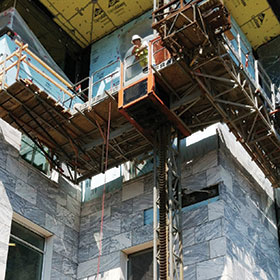Mast Climbers
Is a Used Mast Climber Right for You?
 |
|
Ask the experts about mast climbers, and they’ll tell you to think of the equipment as you would an automobile.
“Mast climbers are like cars,” says Victor Marcantoni, owner of Northeast Mast Climbers (NEMC) and usedmastclimbers.com. “Sitting idle for months or years at a time causes them to lose their ability to work properly. It costs a lot of money to get them back in working order after that.”
For this reason, the Philadelphia-based equipment expert says mason contractors should be sure the aerial work they are planning is expected to take at least one year to complete. Because mast climbers generally provide a variety of platform configurations, smaller contractors may be able to book their units for fa??ade work across multiple jobsites throughout the year. You’ll find these nimble pieces of equipment transporting crews, materials and tools on jobs from brick masonry and CMUs to curtain walls and metal framing.
Once a contractor has determined he indeed can keep the equipment busy, the question becomes how to procure it: buy new, buy used or rent?
Costs are always a factor and, generally, contractors begin weighing them by looking at the purchase price. While used mast climbers run between $30,000 and $50,000, a new unit will require an additional $50,000 to $100,000 – a sizable chunk of change in many of North America’s still-recovering markets. What’s more, resourceful contractors have been known to locate incredible deals on used equipment. “We’ve heard of guys finding that ’57 Chevy in the widow’s backyard. It’s rare, but it happens,” says Clint Bridges, VP of EZ Scaffold.
Bridges’ company, which has manufactured a range of scaffolding equipment since 1991, also sells used equipment sourced from its trade-in program or its rental fleet. Today, he estimates used sales comprises roughly one-third of the company’s businesses.
“There is a big need for used equipment, especially right now, because contractors need to get the best deal for their money,” Bridges says. “The more familiar a contractor is with the equipment, the easier it is for him to buy used, because he has the training and is already comfortable with the machine.”
 |
?? |
| Shown is Apex Friendship High School in Apex, N.C., near Raleigh. This is a new facility using 290,000 bricks from Palmetto Brick Co. and 350,000 CMUs from Old Castle Adams Products. The walls are 60 feet high with CMU back-up, and spray foam insulation and brick veneer comprising the finished skin. The mason contractor is Joyner Masonry Works. The construction manager is Balfour Beatty/Metcon JV. | ?? |
According to NEMC’s Marcantoni, rental historically has made up the majority of his mast-climber business, yet this year’s used equipment sales are up 100 percent from this time last year.
“We have sold used mast climbers to every type of contractor, yet masonry, restoration and glaziers are the typical purchasers,” said Marcantoni. “Most purchasing vs. renting are on the larger side, say at least $10 million in work per year.”
Both EZ Scaffold’s Bridges and Mike Pitt of MastClimbers.com agree the decision to purchase new vs. used often depends on more than financial resources. The amount of time a contractor has to search for a suitable piece of used equipment, as well as his familiarity with the equipment, are two additional factors.
Pitt, who has sold equipment in every manner from in-person to web cam, says it’s the unfamiliar contractor who will make mistakes. He cautions contractors buying their first pieces of used mast-climbing equipment to ask a lot of questions, especially when doing so online.
“Whole groups of people have no problem buying online because they are well informed and know what they are buying. Uninformed buyers make mistakes buying online because the only thing they can really do is compare prices,” said Pitt. “We try to provide as much info as we can so they can buy informed. We will Skype someone to show them the equipment in real time, send them videos or bring the equipment in and put a web cam on it.”
Pitt says who you are buying from is just as important as what you are buying and recommends that used equipment buyers ask for references of the seller’s expertise. “You need to know who the seller is. Is he a forklift expert who just happened to come across a used mast lift and has no idea what it is? That happens a lot.”
“Post-recession, the need for both trade-in deals and the market for used equipment is steadily growing, and the North American market is probably the strongest market currently,” says Kevin O’Shea, director of safety and training for Hydro-Mobile. Hydro-Mobile and its dealer network in the United States and Canada have offered refurbished used equipment for more than 20 years.
“The balance between new and used equipment is tricky,” says O’Shea. “Used equipment does not have new equipment’s warranty or performance aspects, and used equipment may require more support than new equipment.”
In fact, maintenance of used mast climbers can be somewhat of a challenge for contractors without in-house expertise or a large market from which to source parts. Gary Joyner, president of Greenville, N.C.-based Joyner Masonry Works Inc., says his company addresses this challenge with one part creativity, two parts skill.
“We try to find abandoned machines we can use for parts,” Joyner says. “Or, we rebuild the components we need.”
Joyner has stuck exclusively with HEK platform mast climbers for many years and says his loyalty to the brand is not likely to change: “It was the first mast climber we were introduced to, and it performs well for our needs. Not sure we would want to change; in fact, we wouldn’t.”
Marcantoni’s answer to used parts is responsible selling for the long term. “I like to sell contractors the same type of equipment they already own or be sure to sell them all the same equipment. This way the mast, decks and units remain interchangeable.”
The company stocks used parts and also services mast climbers for contractors in the area. “We stock items that typically get worn, and we have most parts for the units that we sell and rent,” Marcantoni says. NEMC has HEK, Alimak and Safi units in its fleets and sells throughout the United States, Canada, Mexico and the Caribbean.
Among the things mason contractor Joyner appreciates about his preferred brand of mast climber is the low number of mechanisms, leaving less chance for wear. The equipment’s simplicity also features a safety element. “The beauty of the equipment is that there aren’t a lot of components, and if one is not functioning properly, the machine will not run,” he says.
MastClimbers.com’s Pitt agrees, and adds that electrical mast climbers require even less maintenance as compared to their gas-powered counterparts: “Think of when you go to cut your grass. When you get to the garage, you don’t wonder whether or not the light’s going to flip on. But when you pull that cord to the mower, you have no idea whether it’s going to start.”
 |
|
| Image courtesy of Joyner Masonry Works |
O’Shea cautions that power selection is a vital decision: “Your standard operating environment will usually determine the best power option. If you are building new construction projects where power might not be readily available, gas or diesel engines might be that the answer. If you are doing confined space work in an elevator shaft, for example, it’s pretty obvious that gas power might present a number of issues.”
In terms by which components are most likely to need attention over the life of equipment, the experts say it’s likely to be the motor, hydraulic cylinders or pumps. Yet, they say, parts and service for used mast climbers – even discontinued machines – are out there.
“Generally speaking, manufacturers still service discontinued equipment,” says Pitt. “There are some companies no longer operating, so there would be no support for that equipment, but most of the equipment around today is so similar you can still get the hardware.”
Pitt points to HEK as an example, saying support is still available for its equipment made in the 1980s. Most components, he says, are available off the shelf. “Most electrical components on these machines are nothing special, and there is very little OEM equipment on these units that you can’t buy from equivalent suppliers,” he says.
Hydro-Mobile’s O’Shea adds that OEM equipment, however, is preferred. “I give the same advice to potential buyers of non-OEM parts, ‘If you are replacing safety-related parts, or components that contribute to providing stability at height, think OEM.’ When you’re busy laying block 100 feet in the air, you need to use equipment that has been designed and tested by the manufacturer.”
|
|||
When buying used mast climbers, NEMC’s Marcantoni advises contractors to ask about the dealer’s pre-sales rehab procedures and, of course, the company’s warranty. For its part, NEMC strips down each unit before it’s sold, changing out all worn parts, as well as sandblasting and repainting the equipment. The company then fits all decks with new Wisa-Hexa wood. NEMC also provides a six-month warranty on all used units sold.
Availability of components is only one aspect of maintaining used equipment. Safety, too, is a major factor for contractors (see sidebar “Five-Point Safety Checklist”).
Most of the experts agree that it is important to buy from a recognized dealer or manufacturer.??? And, not surprisingly, manufacturers are warm to the idea of used sales, making them keen sellers.
“Manufacturers know that used sales will often precede new sales,” says Pitt. “If a contractor likes the used equipment they purchase, they are more likely to stay with that brand, especially if they get good service.”
The key to locating and buying used equipment that will provide financial returns, live a long life and provide a safe work environment appears to be working alongside the experts. O’Shea sums it up well: “Don’t buy used equipment without getting expert advice. If you make the decision alone, alone is exactly what you will be in the process of defending yourself should an accident occur.”
Kelly Moore is a freelance writer and content marketing strategist based in Des Moines, Iowa. She can be reached at kelly@kellymooreconsulting.com.